AI chatbots are transforming eCommerce in 2025 by providing 24/7 customer support, cutting operational costs, and handling up to 80% of routine queries. Whether you’re tracking orders, assisting with returns, or recommending products, these tools save time and improve customer satisfaction. Here’s a quick look at the top 10 AI chatbots for eCommerce:
Quidget.ai: Starting at $16/month, it supports 45+ languages, integrates with Shopify, WooCommerce, and more, and offers advanced AI features.
Tidio: $29/month, known for easy setup and platform compatibility.
ManyChat: $15/month, ideal for social media-based stores with strong Instagram and Facebook integrations.
Gorgias: $60/month, tailored for Shopify with deep integration.
Intercom: $74/month, great for enterprises with advanced customer data tracking.
Chatfuel: $15/month, focuses on Facebook, Instagram, and WhatsApp automation.
Ada: Custom pricing, handles up to 70% of customer queries with advanced AI.
Engati: $12/month, offers multi-channel support and conversational commerce tools.
Jotform Shopify AI: $39/month, specializes in Shopify-native conversational forms.
ProProfs Chat: $19.99/month, simple live chat with AI features for basic automation.
Each option has its strengths, from platform compatibility to pricing, making it crucial to pick one that matches your business size, budget, and goals.
Quick Comparison
| Chatbot | Starting Price | Free Option | Best For | Key Strength | Platform Support |
|---|---|---|---|---|---|
| Quidget.ai | $16/month | 7-day trial | Small to large businesses | No-code setup, 45+ languages | Shopify, WooCommerce, WhatsApp |
| Tidio | $29/month | Yes (limited) | Small businesses | Easy setup, basic automation | Shopify, WooCommerce, Magento |
| ManyChat | $15/month | Yes | Social commerce | Social media integrations | Instagram, Facebook, Shopify |
| Gorgias | $60/month | No | Shopify stores | Deep Shopify integration | Shopify, Magento, BigCommerce |
| Intercom | $74/month | No | Enterprise businesses | Advanced customer data tracking | Most major platforms |
| Chatfuel | $15/month | Yes | Social media-focused stores | Facebook Messenger automation | Facebook, Instagram, WhatsApp |
| Ada | Custom pricing | No | Large enterprises | Handles complex customer queries | Custom integrations |
| Engati | $12/month | Yes | Multi-channel support | Voice and text across platforms | 14+ messaging platforms |
| Jotform Shopify AI | $39/month | Yes (basic) | Shopify-only stores | Shopify-native conversational forms | Shopify only |
| ProProfs Chat | $19.99/month | Yes | Basic automation needs | Simple live chat, mobile app | Shopify, WooCommerce, Magento |
Choose based on your platform, customer volume, and automation needs. Trial options like Quidget.ai let you test features before committing.
5 Best AI Chatbots for Shopify to Improve Customer Service | Feature Comparisons | 2025

Why AI Chatbots Matter for eCommerce
AI chatbots have become a game-changer for online retail, streamlining customer support and addressing common challenges that arise during the shopping experience. They’re not just a convenience – they’re transforming how businesses interact with their customers.
Instant Customer Support, Anytime
Shoppers don’t always browse during business hours. Whether it’s late at night or during a quick break at work, customers expect answers fast. That’s where AI chatbots shine. They’re available 24/7 to handle routine questions, like product details or order updates, ensuring customers get help when they need it – no waiting required.
Cutting Support Costs
Running a human customer service team comes with hefty expenses – think salaries, benefits, and ongoing training. AI chatbots can take over repetitive tasks, like checking order statuses or explaining return policies, without needing a paycheck. This automation slashes operational costs while keeping the support experience smooth and efficient.
Scaling Without Growing Pains
As your business grows, so do customer inquiries. Without a chatbot, this often means scrambling to hire and train new staff, which takes time and money. AI chatbots, however, can scale effortlessly to handle increased demand. This allows your human team to focus on more complex issues while avoiding the stress of constant hiring.
These advantages make it clear why AI chatbots are becoming a must-have tool for eCommerce businesses looking to stay competitive. Up next, we’ll explore the leading platforms and potential challenges to watch out for.
1. Quidget.ai
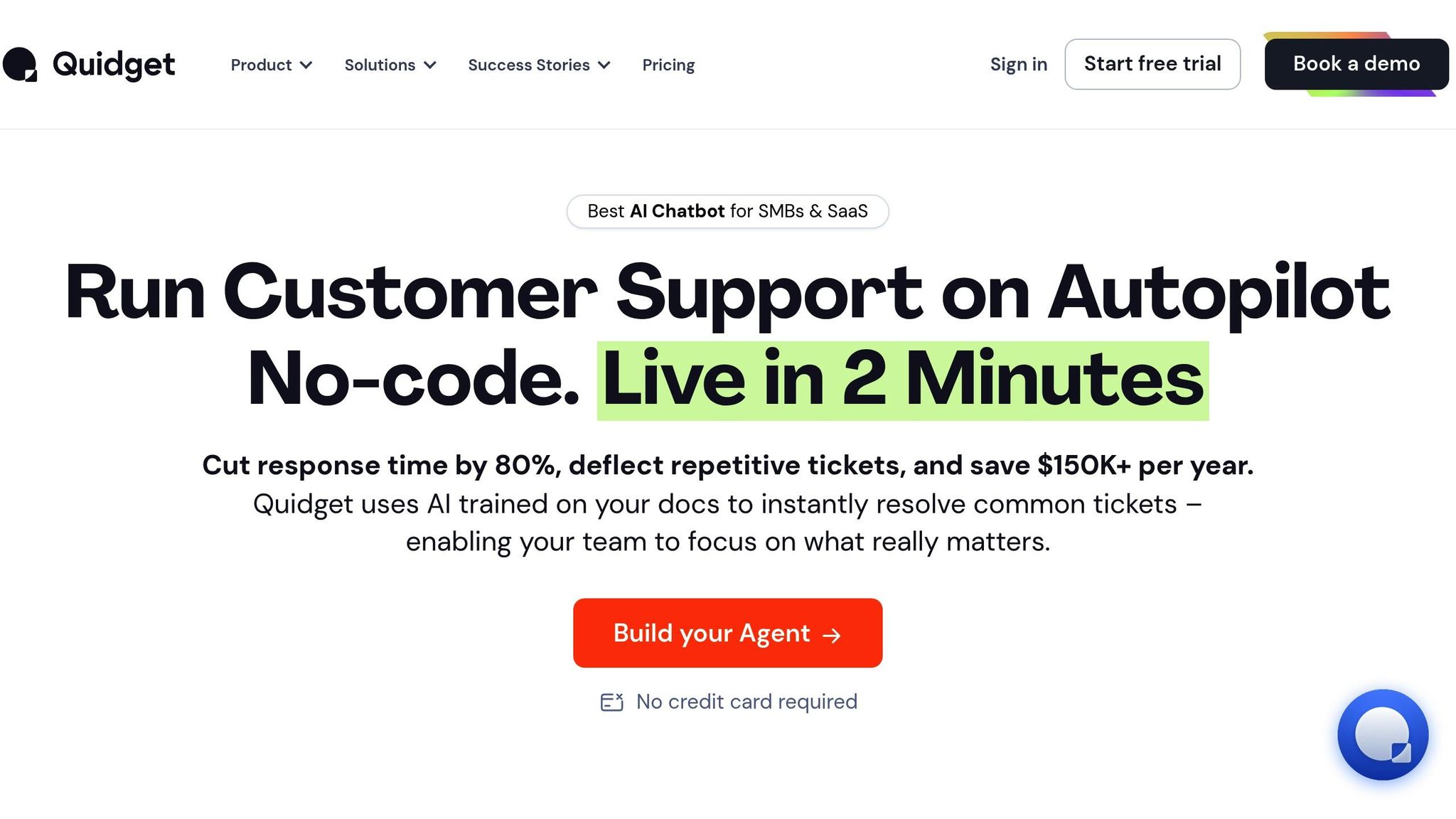
Quidget.ai is built for businesses looking to automate customer support while maintaining a personal touch. Unlike traditional chatbots that rely on pre-written scripts, Quidget trains its AI agents using your business’s actual data, ensuring conversations feel natural and genuinely helpful. Here’s what makes Quidget.ai stand out: platform compatibility, advanced AI features, flexible pricing, and super-duper easy integration.
The platform is developed by SupportYourApp, a company with 14 years of experience in customer support. This expertise shapes Quidget’s ability to tackle service challenges that other chatbot providers might miss.
Platform Compatibility
Quidget.ai works seamlessly across all major eCommerce platforms, requiring no complicated setup. It supports Shopify, WooCommerce, WordPress, Wix, and Webflow. For custom websites, integration is straightforward via Google Tag Manager or by embedding the chatbot directly into your site or app.
This flexibility ensures that your AI agent operates uniformly across platforms, eliminating the hassle of rebuilding when switching systems.
AI Capabilities
Quidget goes beyond answering basic FAQs. Its AI agents are trained on your specific business content, enabling them to handle tasks like answering order status inquiries and offering product recommendations.
The platform supports over 45 languages and can seamlessly transfer complex conversations to human agents when needed. With pre-built templates for tasks like customer support, sales, and lead generation, you can get a functional chatbot running in just minutes instead of weeks.
Pricing Plans
Quidget offers four pricing tiers, all with a 7-day free trial and no credit card required:
- Starter Plan ($16/month): Includes 500 AI responses, 1 chatbot, and 2 team seats – perfect for small businesses exploring AI support.
- Pro Plan ($79/month): Provides 10,000 monthly responses, 5 chatbots, API access, and web crawling capabilities.
- Pro Plus ($210/month): Offers 50,000 responses, 50 chatbots, branding removal, and enterprise-grade integrations.
- Enterprise ($599/month): Custom usage limits, dedicated account management, and white-labeling options.
Choosing annual billing can save up to 20% on all plans, making the Pro plan cost just $63/month when billed yearly.
Integration Support
Quidget.ai integrates effortlessly with the tools you rely on every day. For customer service, it connects with platforms like Zendesk, Freshdesk, and Intercom. It also supports popular messaging apps, including WhatsApp, Telegram, Slack, Viber, and Facebook Messenger.
For eCommerce businesses offering consultations or demos, the Calendly integration is a game-changer. It allows customers to book appointments directly through the chatbot, without ever leaving your website.
2. Tidio
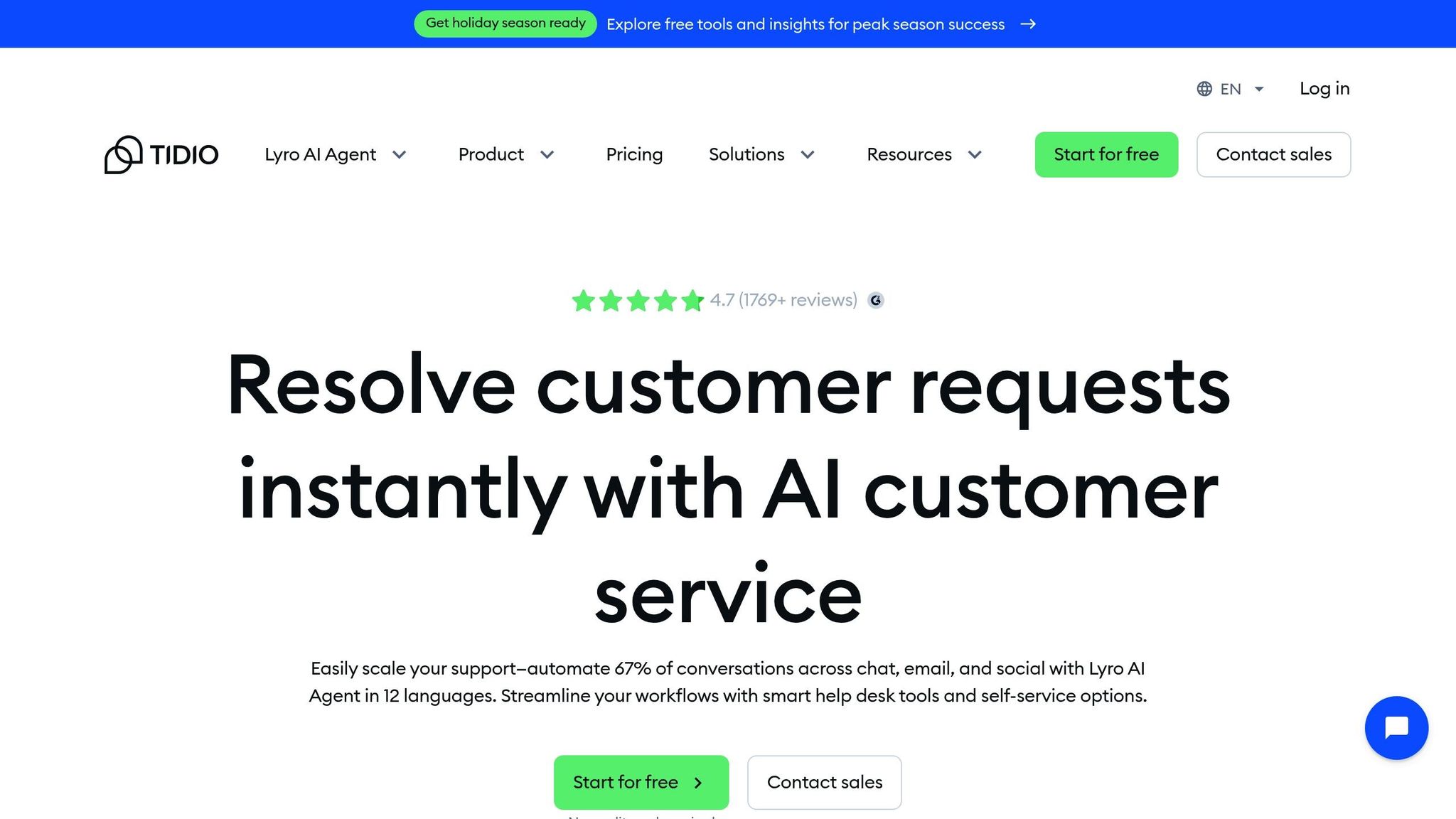
Tidio stands out for its extensive support across ecommerce platforms. It offers native integrations with popular platforms like Shopify, WordPress, WooCommerce, and Squarespace, making it a versatile option for online businesses. For Shopify users, Tidio provides a particularly robust integration designed to meet the specific needs of store owners, ensuring consistent and dependable performance. This strong compatibility makes Tidio a reliable choice for businesses looking to streamline their operations with native platform connections.
3. ManyChat
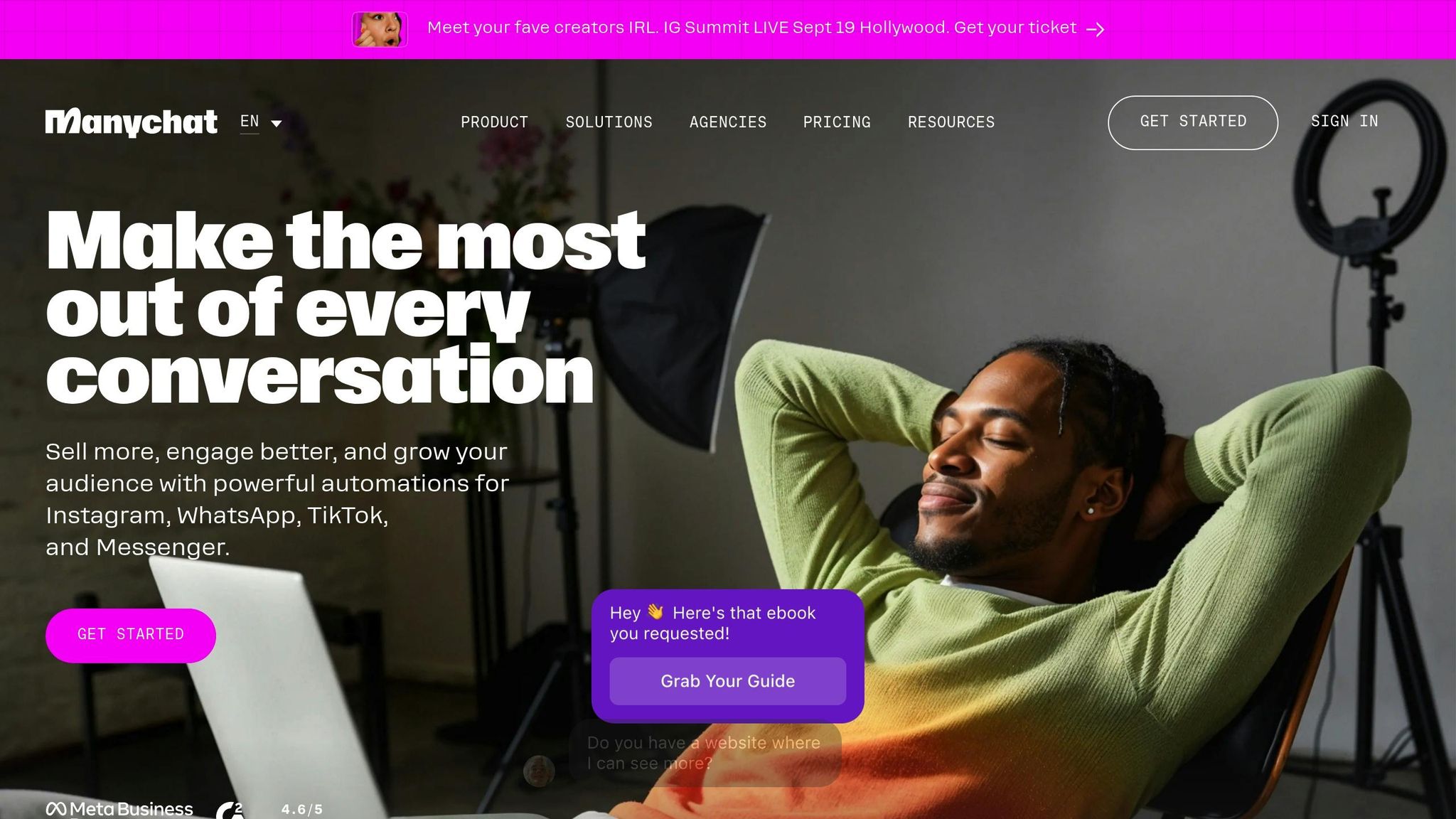
ManyChat connects seamlessly with popular social media messaging platforms like Instagram, WhatsApp, Messenger, and TikTok. For ecommerce businesses, this means reaching customers where they already spend their time, making it easier to engage shoppers and drive sales. Its ability to operate across multiple channels lays the foundation for effective store integrations.
Platform Compatibility
Although ManyChat no longer offers a direct Shopify app, you can still link your Shopify store through third-party tools like Zapier, Make, Latenode, Pabbly Connect, Integrately, Albato, or Pipedream. These integrations allow you to automate key processes, such as cart recovery, personalized product recommendations, and order updates.
AI Capabilities
ManyChat takes care of FAQs and routine customer inquiries, freeing up your support team to handle more complex tasks. Using Shopify’s Product Catalog feature, it can recommend products based on customer behavior and even generate personalized coupons that sync with your store. The platform also responds to Shopify Trigger Events automatically – sending messages when a cart is abandoned or a purchase is completed. This is especially useful since nearly 89% of online store visitors don’t add items to their carts during their first visit. These AI-driven tools work hand in hand with ManyChat’s integration features to enhance customer engagement.
Integration Support
ManyChat’s Growth Tools are designed to convert visitors into subscribers with features like sticky pop-ups, page takeovers, floating bars, and chat widgets. It also supports automated marketing campaigns on Messenger and SMS, such as abandoned cart reminders and product browse follow-ups. Additionally, the platform enables you to collect customer details directly from your Shopify store visitors, streamlining your marketing efforts.
Pricing Plans
ManyChat offers both free and premium plans, making it a flexible choice for businesses looking to scale their ecommerce operations.
4. Gorgias
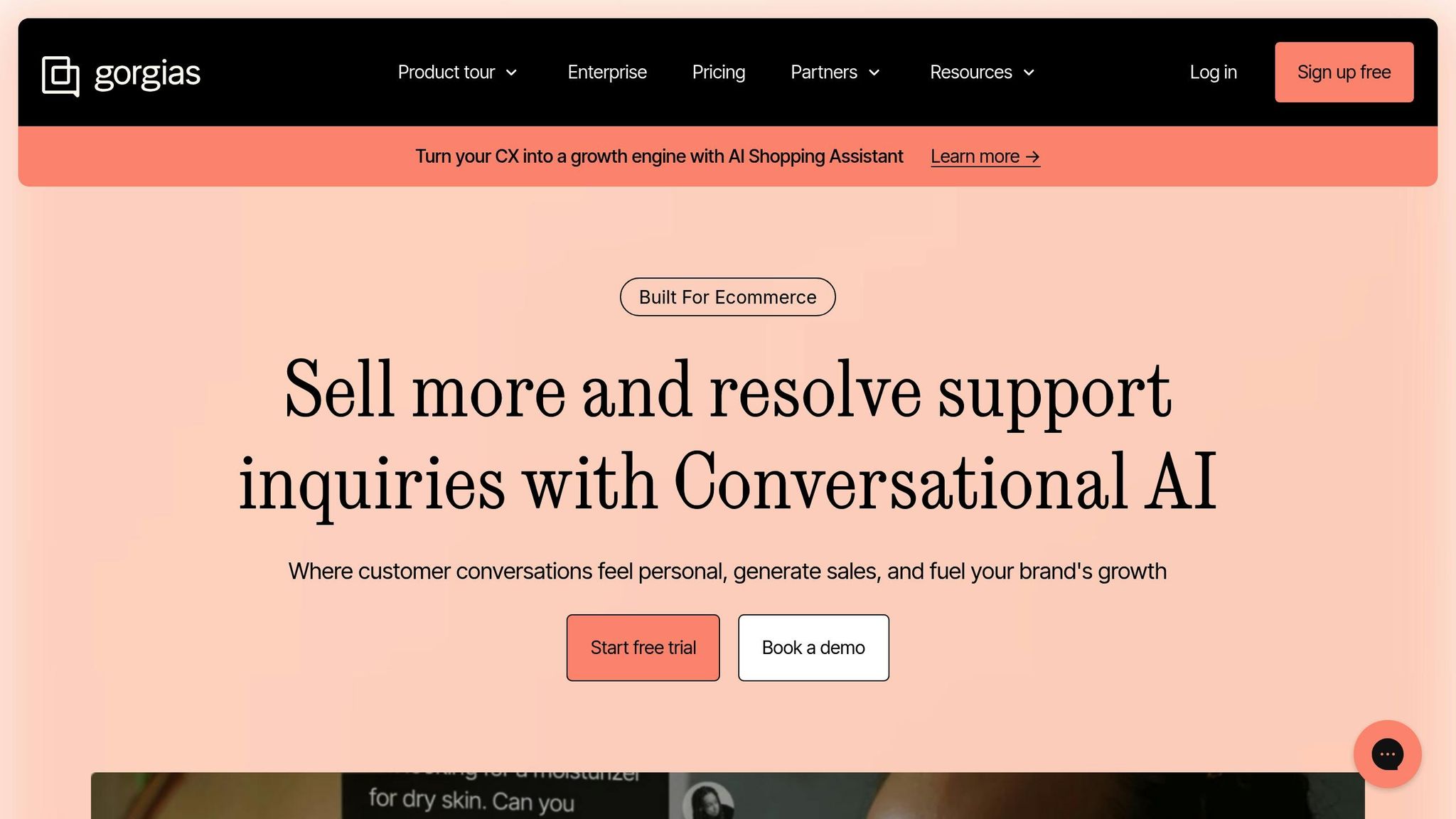
Gorgias is a customer service automation platform tailored for ecommerce businesses, especially those using Shopify. It streamlines customer inquiries with AI-driven responses while equipping support agents with key details like order history, customer data, and purchase information. Its seamless integration with ecommerce platforms sets it apart.
Platform Compatibility
Gorgias integrates directly with Shopify, Shopify Plus, BigCommerce, and Magento. It pulls essential customer data – such as order status, shipping details, and purchase history – straight from your ecommerce backend, so agents can handle requests without toggling between systems. Shopify users benefit from automatic syncing of customer profiles, order details, and product catalogs.
For WooCommerce users, Gorgias connects via API integrations, though this setup requires more technical expertise compared to Shopify. Custom websites can also integrate using Gorgias’ REST API, but developer assistance is often needed.
AI Capabilities
Gorgias employs intent detection to route messages to the right team or provide automated responses. It can resolve common ecommerce queries – like checking order status, handling return requests, or answering shipping-related questions – without requiring human intervention.
Its Automate feature uses pre-built templates to address repetitive questions. For instance, if a customer asks, "Where is my order?", the AI retrieves tracking details from the shipping provider and sends a personalized update with the delivery status.
Integration Support
Gorgias connects with major communication channels, including email, live chat, SMS, WhatsApp Business, Facebook Messenger, and Instagram DMs. All conversations are unified in a single dashboard, ensuring a consistent experience across platforms.
The platform also integrates with tools like:
- Klaviyo for email marketing
- Yotpo for customer reviews
- Recharge for subscription management
- Loop Returns for return processing
These integrations let agents handle tasks like issuing refunds or updating subscriptions directly within Gorgias. Additionally, Slack integration ensures your team gets real-time alerts for urgent tickets or high-value customers, while Zendesk migration tools simplify the process of transferring ticket histories and customer data when switching systems.
Pricing Plans
Gorgias offers a free trial, but no permanent free plan. Its pricing tiers are designed to accommodate businesses of varying sizes:
- Starter Plan: $10/month for up to 50 tickets, suitable for small stores scaling their support.
- Basic Plan: $60/month for up to 300 tickets, including AI automation features.
- Pro Plan: $360/month for up to 2,000 tickets, offering advanced reporting and integrations.
- Advanced and Enterprise Plans: Custom pricing based on ticket volume and additional needs.
For most ecommerce businesses, the Basic or Pro plans provide sufficient features. As customer service demands grow – especially during busy seasons – upgrading to higher tiers becomes a practical option.
5. Intercom
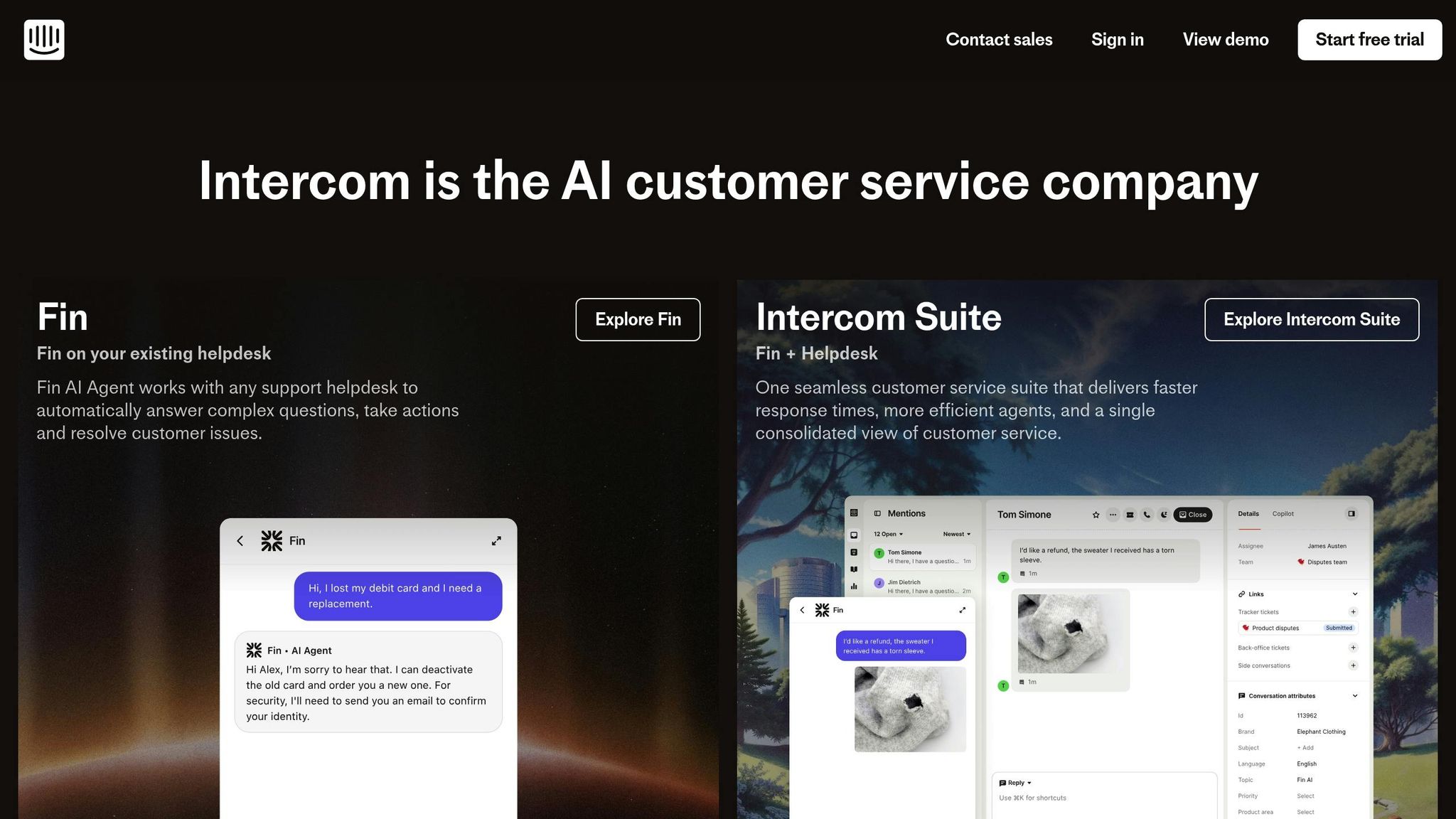
Intercom is a messaging platform designed to enhance customer support for ecommerce businesses.
Platform Compatibility
If you’re using WooCommerce, Intercom offers a dedicated plugin available through the WooCommerce Marketplace. This plugin allows you to link Intercom with your WooCommerce store effortlessly, making it a convenient option for merchants looking to streamline their customer support.
6. Chatfuel
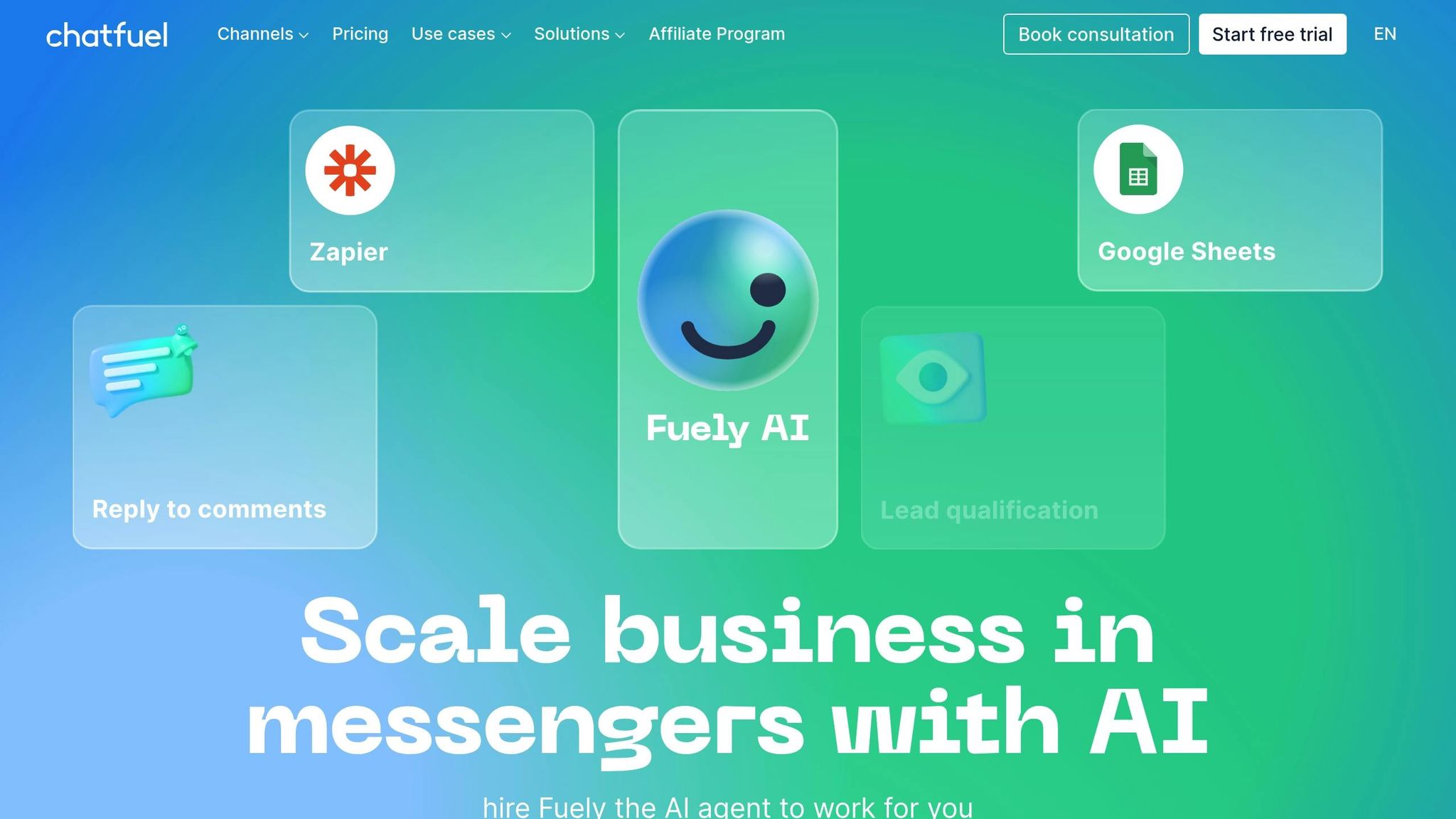
Chatfuel is a messaging platform designed to create AI-powered chatbots for Facebook, Instagram, and WhatsApp. It focuses on automating customer interactions and qualifying leads, making it a valuable tool for ecommerce businesses.
Platform Compatibility
Chatfuel operates exclusively within Meta’s ecosystem, meaning it supports Facebook Messenger, Instagram Direct Messages, and WhatsApp Business. This makes it an excellent choice for ecommerce stores that rely heavily on social media for marketing and customer engagement. However, it doesn’t directly integrate with ecommerce platforms like Shopify or WooCommerce. Instead, it connects through the social media platforms where your customers are already interacting with your brand. This targeted compatibility allows Chatfuel to hone its AI features for Meta’s channels.
AI Capabilities
Powered by ChatGPT, Chatfuel automates initial conversations with customers, handling tasks like answering FAQs, collecting customer data, and qualifying leads before passing them to human agents. It can also manage product inquiries and handle basic order status updates independently, reducing the need for constant human involvement.
Pricing Plans
Chatfuel uses a conversation-based pricing model and offers a 7-day free trial, which includes 50 free conversations. Here’s a breakdown of its paid plans:
- Business Plan for Facebook/Instagram: Starts at $19.99/month for 1,000 conversations, with additional conversations priced at $0.02 each.
- Business Plan for WhatsApp: Starts at $49.49/month.
- Enterprise Plan: Begins at $300/month.
A "conversation" is defined as a single written interaction that ends after 24 hours of inactivity. If a customer sends another message after this period, it’s counted as a new conversation.
Integration Support
Chatfuel integrates smoothly with Meta’s business tools and includes built-in live chat functionality. However, there are some limitations. For example, you can’t duplicate chatbot flows across Meta’s platforms, meaning you’ll need to create separate bots for Facebook, Instagram, and WhatsApp rather than using one bot across all channels.
Despite this, Chatfuel has received strong reviews, with a 4.5/5 rating on G2 and 4.4/5 on both Capterra and Software Advice. Users frequently highlight its intuitive interface and affordability, particularly for small businesses looking to enhance their customer engagement.
sbb-itb-58cc2bf
7. Ada
Continuing our exploration of powerful AI tools for ecommerce, Ada stands out as a comprehensive customer service solution. This AI-driven platform is designed to handle entire customer interactions, from the initial query to resolution.
Platform Compatibility
Ada seamlessly integrates with Shopify, offering features like real-time shipping updates and order tracking. It also connects with popular CRMs and other ecommerce tools through API integrations. Additionally, it supports Google Tag Manager for tracking and analytics. For example, one merchant paired Ada with their Zendesk help center to deliver real-time updates. However, it’s worth noting that Ada does not currently offer support for WooCommerce.
AI Capabilities
Ada’s AI takes on complete customer service conversations, aiming to resolve issues independently through what it calls "Automated Resolutions." This metric tracks interactions fully managed by the AI. Impressively, Ada’s AI can handle up to 70% of customer queries, seamlessly transferring more complex issues to human agents when necessary. This end-to-end automation reduces the need for multiple support touchpoints, making it a game-changer for many businesses.
Pricing Plans
Ada’s pricing is tailored to each business, with no free plan available. Costs typically range from $4,000 to over $60,000 annually. Instead of charging per message, Ada uses a pricing model based on the number of Automated Resolutions. To receive a custom quote, businesses need to provide specifics like their monthly ticket volume and the number of human agents they employ.
Integration Support
Ada goes beyond ecommerce platforms by integrating with tools like Zendesk for smooth agent handoffs. While some users have found the integration process less intuitive, major brands like Canva rely on Ada to manage automated customer interactions. Since 2021, an entertainment company has used Ada to serve thousands of clients while reducing the need for additional support agents.
User Feedback
Ada has received mixed reviews. On Capterra, it boasts a 4.7/5 rating from 15 reviews, with users praising its frequent updates and user-friendly interface. However, it fares less well on Trustpilot, where it holds a 2.0/5 rating, with some users citing concerns over AI accuracy and responsiveness.
"Very happy with Ada… I like how easy it is to navigate the platform and how much you can do on your own. It’s very user-friendly!"
– Evelina H., Technical Specialist Customer Experience
Ada continues to be a compelling option for businesses looking to streamline customer service, though its mixed reviews suggest it may not be the perfect fit for everyone.
8. Engati
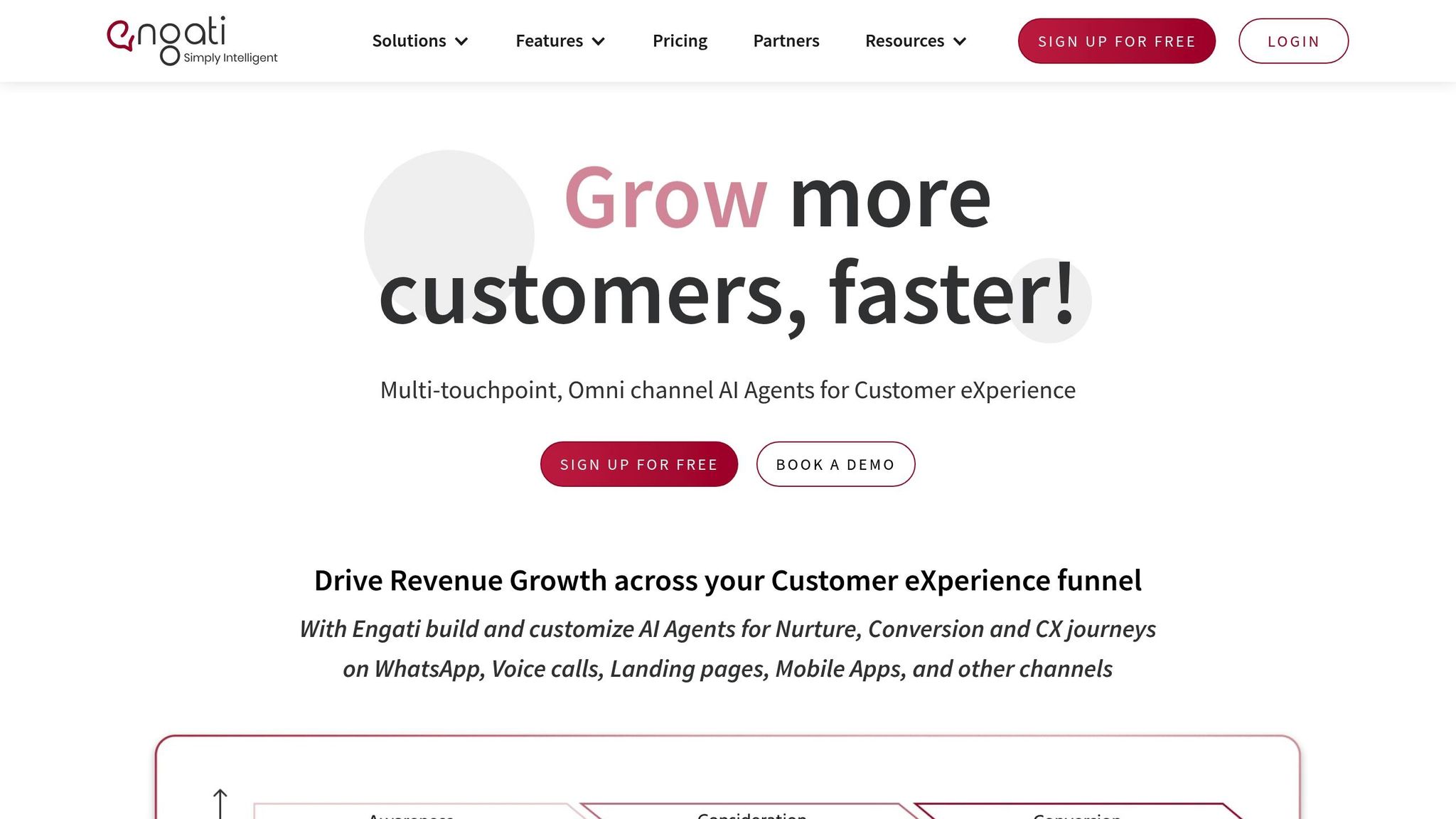
Engati is an AI chatbot platform built to provide seamless customer support across multiple channels, making it a great fit for ecommerce businesses that need to stay connected with their customers on various platforms.
Platform Compatibility
Engati works smoothly with popular ecommerce platforms like Shopify and WooCommerce. It can also be embedded on custom websites using JavaScript widgets, giving businesses the tools to manage product catalogs and customer inquiries directly through the chatbot. This integration ensures smoother operations and better customer engagement.
AI Capabilities
The platform is tailored for conversational commerce, allowing customers to browse products, check order statuses, and get support through natural language conversations. Engati’s chatbot can suggest products based on customer needs and supports multiple languages, making it ideal for businesses with a global audience. It also includes sentiment analysis to gauge customer emotions and can transfer chats to human agents when necessary.
Pricing Plans
Engati offers a free plan with basic chatbot features, alongside paid plans that provide higher messaging limits and advanced functionality. For detailed pricing information, check out Engati’s website.
Integration Support
Engati connects with a wide range of tools and platforms. It integrates with messaging apps like WhatsApp Business API, Facebook Messenger, Telegram, Slack, and Microsoft Teams. It also works with CRMs such as HubSpot and Salesforce and supports third-party app connections through platforms like Zapier. Additionally, its built-in analytics help businesses monitor and analyze conversation data effectively.
9. Jotform Shopify AI Chatbots
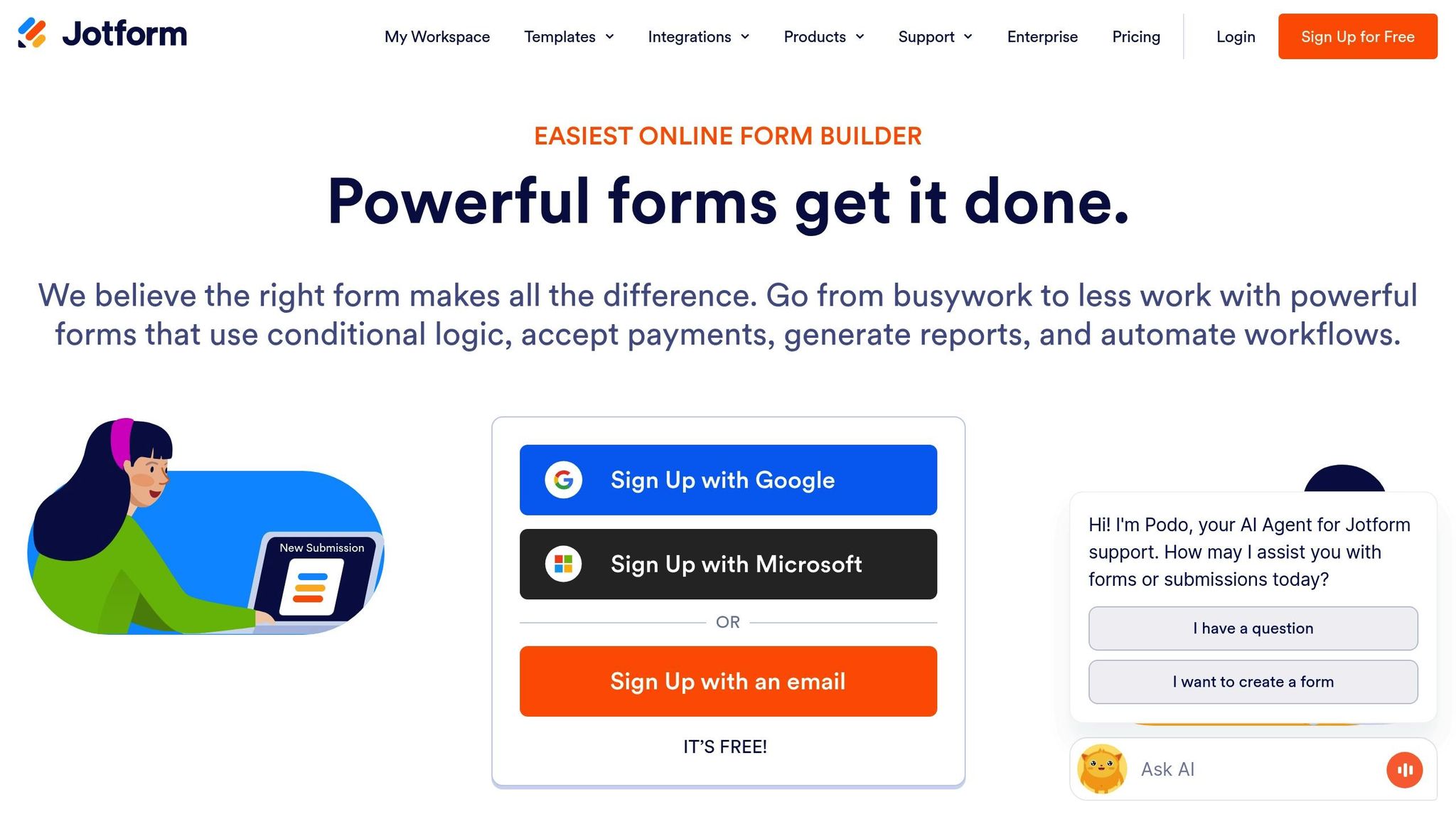
For online stores looking to streamline how they gather customer information, Jotform offers an AI-powered tool tailored for Shopify. This chatbot-style solution turns traditional form filling into a conversational experience, making it easier to collect essential customer data.
Platform Compatibility
Jotform’s AI chatbot is built specifically for Shopify but offers flexibility for other platforms too. It can be embedded directly onto product pages, checkout processes, or customer service sections within Shopify. For businesses using custom-built websites, the chatbot can also be added using standard embedding methods, providing options for seamless integration.
AI Capabilities
Instead of static form fields, Jotform uses a conversational approach to gather information. Customers interact with a chat-like interface, answering questions in a natural flow. The tool even adapts its questions dynamically, using conditional logic to ask follow-ups based on earlier responses. This makes the process feel more personal and engaging while ensuring businesses get the data they need.
Integration Support
Jotform doesn’t stop at conversational features. It connects with popular ecommerce and productivity tools, enhancing its usability across various workflows. For more details on pricing, features, or how to set up integrations, check out Jotform’s official documentation.
10. ProProfs Chat
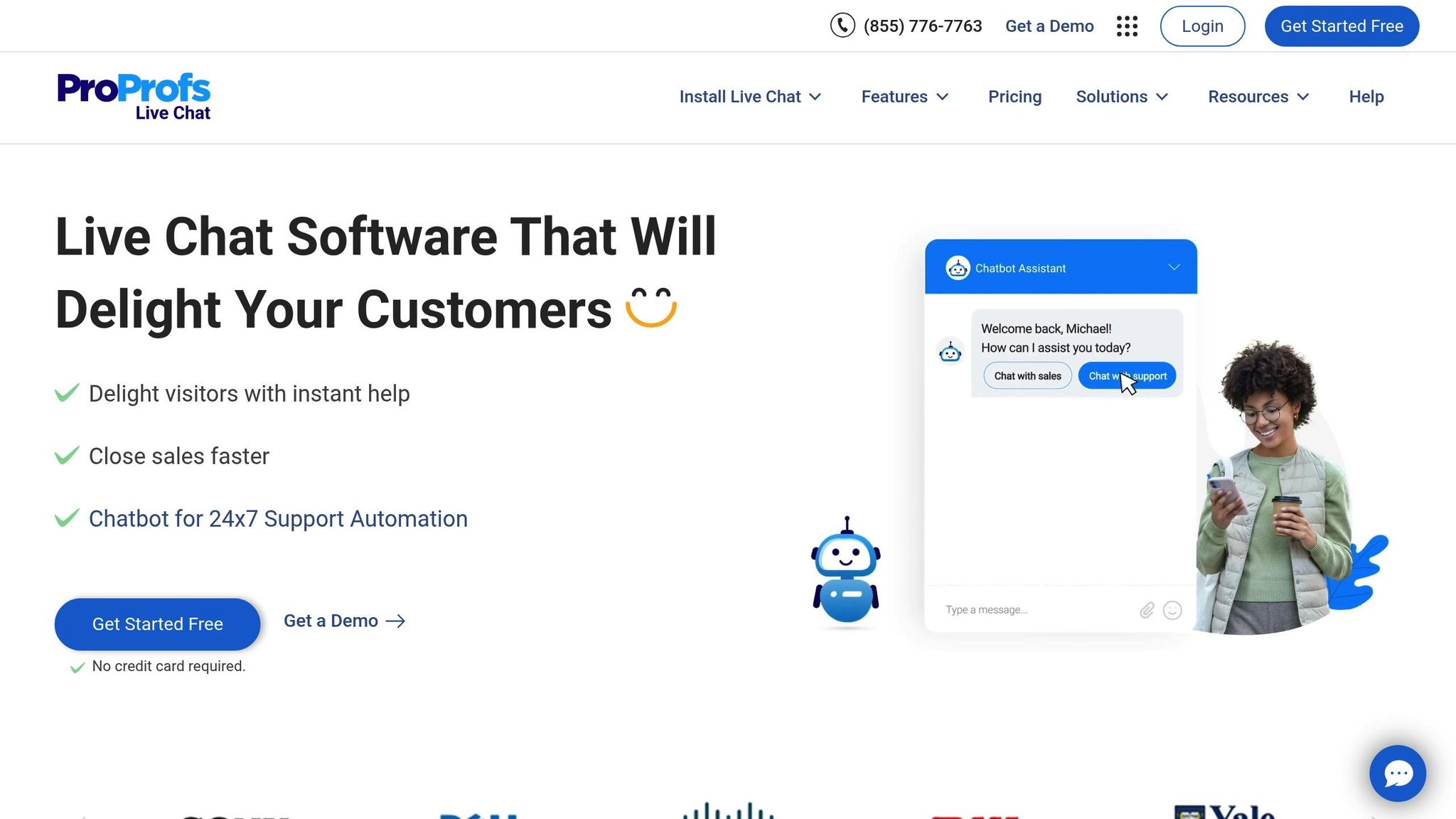
ProProfs Chat is a live chat tool designed to offer straightforward AI-driven features for eCommerce businesses. It strikes a balance by providing automation without overwhelming complexity, making it a practical choice for online stores.
Platform Compatibility
ProProfs Chat is compatible with popular eCommerce platforms like Shopify, WooCommerce, and Magento. Setting it up is simple – just add a single JavaScript snippet to your site. The chat widget seamlessly matches your website’s design and can be customized to align with your brand’s look and feel.
The widget works smoothly across devices, ensuring a consistent experience on both iOS and Android browsers. Additionally, store owners can manage customer interactions on the go using a mobile app, ensuring constant engagement no matter where they are.
AI Capabilities
The AI features in ProProfs Chat focus on basic automation. These include greeting visitors, routing conversations to the right team, and providing quick responses to frequently asked questions about topics like shipping, returns, or product availability.
For instance, if a customer asks about "delivery" or "shipping time", the system can instantly provide standard shipping information. The tool also tracks visitor activity, enabling agents to step in with timely and relevant support.
Pricing Plans
ProProfs Chat offers both free and paid options. The free plan includes essential chat features, making it ideal for smaller stores. Paid plans unlock additional benefits like unlimited chats, chat transcripts, visitor insights, and advanced reporting tools. Higher-tier plans come with extras such as chat routing, file sharing, and more integration options.
Integration Support
ProProfs Chat seamlessly integrates with various tools, including CRM systems, email marketing platforms, help desk software, and team communication apps. These integrations ensure that customer conversations fit into your existing workflow. Agents can also convert live chats into support tickets when necessary, streamlining the support process.
Side-by-Side Comparison
Picking the right AI chatbot for your eCommerce store gets simpler when you can compare all the options side by side. Below is a detailed table summarizing the key differences between 10 popular platforms, making it easier to weigh your choices.
| Chatbot | Starting Price | Free Option | Best For | Key Strength | Platform Support |
|---|---|---|---|---|---|
| Quidget.ai | $16/month | 7-day trial | Small to large businesses | No-code AI agent builder with 45+ languages | Shopify, WooCommerce, WhatsApp, Telegram |
| Tidio | $29/month | Yes (limited) | Small businesses | Simple setup with basic automation | Shopify, WooCommerce, Magento |
| ManyChat | $15/month | Yes | Social commerce | Instagram and Facebook integration | Instagram, Facebook, Shopify |
| Gorgias | $60/month | No | Shopify stores | Deep Shopify integration | Shopify, Magento, BigCommerce |
| Intercom | $74/month | No | Enterprise businesses | Advanced customer data tracking | Most major platforms |
| Chatfuel | $15/month | Yes | Social media focused | Facebook Messenger automation | Facebook, Instagram, Telegram |
| Ada | Custom pricing | No | Large enterprises | Advanced AI capabilities | Custom integrations |
| Engati | $12/month | Yes | Multi-channel support | Voice and text across platforms | 14+ messaging platforms |
| Jotform Shopify AI | $39/month | Yes (basic) | Shopify-only stores | Native Shopify integration | Shopify only |
| ProProfs Chat | $19.99/month | Yes | Basic automation needs | Simple live chat with AI features | Shopify, WooCommerce, Magento |
Pricing Breakdown by Business Size
Here’s how pricing aligns with different business sizes:
- Small Businesses (Under $100K annual revenue): Budget-friendly options include Engati ($12/month), ManyChat and Chatfuel (both $15/month), and Quidget.ai ($16/month). These are ideal for startups or businesses with limited resources.
- Growing Businesses ($100K – $1M annual revenue): Mid-tier platforms like ProProfs Chat ($19.99/month), Tidio ($29/month), and Jotform Shopify AI ($39/month) offer more advanced features to support growth.
- Established Businesses ($1M+ annual revenue): Premium solutions like Gorgias ($60/month) and Intercom ($74/month) are designed to handle complex workflows and high customer interaction volumes.
Platform Compatibility Comparison
Shopify-First Solutions: If Shopify is your main platform, Gorgias and Jotform Shopify AI provide the deepest integrations. However, this focus means they might not be ideal if you plan to expand to other platforms in the future.
Multi-Platform Champions: Tools like Quidget.ai, Tidio, and ProProfs Chat are more versatile, supporting multiple eCommerce platforms. They’re a great fit for sellers managing multiple storefronts or marketplaces.
Social Commerce Leaders: ManyChat and Chatfuel shine when it comes to Instagram and Facebook integrations, making them perfect for businesses heavily invested in social media.
AI Capabilities Ranked
The level of AI sophistication varies across these platforms:
- Most Advanced AI: Ada and Quidget.ai stand out with powerful AI training capabilities that go beyond basic automation.
- Moderate AI Features: Intercom, Gorgias, and Engati offer reliable AI tools for common tasks like order tracking and FAQ handling.
- Basic AI Support: Platforms like Tidio, ManyChat, Chatfuel, Jotform Shopify AI, and ProProfs Chat focus more on straightforward, rule-based automation.
Free Plan Reality Check
Several platforms offer free plans, but their limitations can be a dealbreaker for active eCommerce stores. For example:
- Tidio’s free plan includes basic chat features but limits AI responses.
- ManyChat and Chatfuel allow only a limited number of interactions per month.
- Engati and ProProfs Chat provide basic functionality but cap conversations.
Most free plans restrict you to 100–500 conversations per month, which can be too low for stores with moderate to high traffic. Quidget.ai takes a different approach by offering a full-featured 7-day trial, giving you the chance to test everything before committing.
Integration Ecosystem
The right chatbot should work seamlessly with your existing tools. Here’s how these platforms stack up:
- CRM Integration Leaders: Intercom and Gorgias excel at syncing customer data with popular CRM systems, ensuring smooth workflows across your tech stack.
- Marketing Tool Connections: ManyChat and Chatfuel are deeply integrated with Facebook’s advertising tools, making them ideal for social commerce campaigns.
- Help Desk Integration: Gorgias, Intercom, and Quidget.ai connect effortlessly with help desk platforms like Zendesk and Freshdesk, streamlining customer support.
Your choice should align with your current tools and workflow. For example, if you’re already using Shopify or Facebook heavily, selecting a chatbot with native integration will save time and effort in the long run.
Pros & Cons: What Most People Get Wrong About AI Chatbots
AI chatbots often get misunderstood by eCommerce store owners. Some expect them to perform miracles, while others dismiss their potential entirely. The truth lies somewhere in the middle – chatbots shine when they handle routine queries, freeing up human agents to tackle more complex and nuanced customer needs.
The Real Advantages (Beyond the Obvious)
Always on: Chatbots never sleep. They’re available 24/7 to handle common questions, letting your human team focus on more pressing or complicated tasks.
Cost efficiency: A well-set-up chatbot can manage up to 80% of routine customer inquiries. This means your team can serve more customers without hiring extra help, which is especially useful during peak shopping seasons.
Quick responses: Today’s customers don’t like to wait. Chatbots ensure immediate acknowledgment, keeping visitors engaged and less likely to leave in frustration.
Data insights: Every interaction with a chatbot is logged, offering valuable insights into customer questions and areas where your site or processes might need improvement.
The Hidden Disadvantages
Setup challenges: Tools like Quidget.ai make launching a chatbot easier, but customization takes effort. You’ll need to program it with accurate product details, return policies, and responses to typical customer scenarios.
Limited understanding: Chatbots aren’t perfect. They can struggle with nuanced requests or emotional situations. When things get too complicated, human agents are essential to step in and provide empathy or personalized solutions.
Customer hesitation: Not everyone loves talking to a bot. Some customers prefer human interaction and may request a handoff the moment they realize they’re chatting with AI. A seamless transition from bot to human support is crucial in these cases.
Ongoing updates: As your business evolves – whether it’s new products, updated policies, or shifting customer concerns – your chatbot will need regular updates to stay relevant. Neglecting this can erode customer trust over time.
These drawbacks help explain why misconceptions about chatbot capabilities continue to persist.
What Most People Get Wrong
One of the biggest missteps is assuming AI chatbots can replace human agents entirely. In reality, the best chatbots act as a first line of defense – answering routine questions and gathering initial details before escalating more complex issues to human staff.
Another common oversight is underestimating the importance of training. Fine-tuning a chatbot to reflect your specific products, policies, and customer needs is what makes it truly effective.
Integration is another sticking point. While many chatbots offer integrations with help desks, CRMs, and inventory systems, setting up smooth data flows often requires careful planning and technical know-how.
Lastly, many businesses expect instant results. While chatbots can reduce support tickets right away, their full impact – especially during high-traffic periods like seasonal sales – becomes clearer over time. Patience is key to seeing their long-term benefits.
Ultimately, AI chatbots aren’t about replacing your team but amplifying their efforts. By handling repetitive tasks, they allow your human agents to focus on building stronger customer relationships and solving problems that require a personal touch.
Conclusion
Picking the right AI chatbot for eCommerce boils down to three main considerations: platform compatibility, available features, and your budget. Whether you’re running a Shopify store or a WooCommerce site, or managing a small business versus a large-scale enterprise, the needs can vary significantly. Focusing on these priorities helps you choose a solution tailored to your specific goals.
The best AI chatbots do much more than answer FAQs. They can track orders, suggest products, support multiple languages, and operate around the clock – reducing support costs while increasing conversions.
Smooth integration with your existing tools is essential to keep things efficient. Don’t just look at the base pricing; factor in the overall value. Free trials are a great way to explore features without commitment.
Start by addressing common customer questions, then expand into areas like personalized product recommendations and cart recovery as the chatbot grows with your business.
By matching the chatbot’s features, integrations, and pricing to your business model, you can automate customer service effectively.
Try Quidget free for 7 days to see how it works for your business. With its no-code setup, support for more than 45 languages, and simple integration with top eCommerce platforms, you can have an AI-powered customer service assistant up and running in minutes.
FAQs
How do AI chatbots improve customer service for eCommerce beyond just answering common questions?
AI chatbots are transforming customer service in eCommerce by delivering personalized, real-time assistance that does more than just answer simple FAQs. They can manage tasks such as helping customers track orders, suggesting products based on individual preferences, and even tackling more complicated inquiries.
By analyzing customer data, these chatbots can anticipate needs and address potential concerns proactively, which boosts satisfaction and builds loyalty. Plus, with their 24/7 availability, they ensure faster response times while freeing up human agents to handle more complex challenges. The result? A smoother, more efficient shopping experience for everyone.
What should I look for when selecting an AI chatbot for my eCommerce store?
When selecting an AI chatbot for your eCommerce store, it’s essential to focus on features that meet your specific business needs. Here are some important considerations:
- Platform compatibility: Make sure the chatbot integrates effortlessly with your eCommerce platform, whether you’re using Shopify, WooCommerce, or another system. Seamless integration ensures everything works smoothly without extra headaches.
- Scalability: As your business grows, so will your customer base. Choose a chatbot that can handle increased traffic without compromising performance.
- Customer support features: Look for features like multilingual capabilities, tailored responses, and 24/7 availability. These tools can significantly improve the customer experience.
- Data security: Protecting customer information is non-negotiable. Opt for chatbots with robust privacy and security measures to keep data safe.
- Analytics tools: Chatbots equipped with performance tracking can help you understand customer interactions better and fine-tune your approach for improved results.
By keeping these factors in mind, you can find a chatbot that not only meets your current needs but also supports your long-term growth.
How do I integrate an AI chatbot with my eCommerce platform and tools?
To add an AI chatbot to your eCommerce platform, the first step is picking a chatbot solution that works seamlessly with your setup – whether you’re using Shopify, WooCommerce, or a custom-built site. Look for tools that provide API integrations or plugins to simplify the installation process.
After selecting the right chatbot, link it to your platform and ensure it has access to essential systems like customer data, product inventories, and order management. Properly setting it up enables the chatbot to handle tasks such as answering customer inquiries, processing transactions, and offering tailored product recommendations. This ensures a smoother, more efficient shopping experience for your customers while streamlining your operations.


